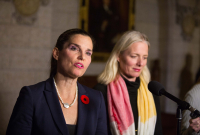Support strong Canadian climate journalism for 2025
Canada's New Democrats are pressing the Trudeau government to take urgent, "ambitious" action to save a group of environmental research networks that may soon run out of funds.
In a letter sent to Prime Minister Justin Trudeau last week, NDP environment critic Linda Duncan urged the government to restore funding for the seven networks — including a world-renowned Arctic laboratory — before the $35-million grant program that's keeping their lights on expires at the end of March.
"While this Liberal government has made numerous statements in the past assuring Canadians that science-based evidence will be fundamental to this government's policy making, either ending or offering only stop-gap support (for climate change research) would render that pledge meaningless," wrote Duncan in the Jan. 26 letter, reviewed by National Observer.
If no federal funding is announced before March, said Duncan, the research stations would shut down shortly after the Intergovernmental Panel on Climate Change (IPCC) convenes in Edmonton between March 5 and 7. She doubted that members of the international group, established by the United Nations Environment Programme and World Meteorological Organization, would be impressed by Canada's lack of commitment.
"It is reprehensible that (the Liberals) have left the scientists hanging still," Duncan told National Observer on Monday. "Here we are with the IPCC coming to Edmonton in March — the leading climate scientists of the world — so I’m simply giving them a heads up, it might be a good idea if they commit before then."
Science minister defends Canada's commitment
Duncan's letter states that committing to a long-term extension of the Climate Change and Atmospheric Research (CCAR) funding program, which supports the environmental research networks, would "speak volumes about this government's commitment to Canada's current and future scientific communities."
The CCAR program, offered to Canadian universities, was established by the Harper government as Canada faced international scrutiny for its lack of climate action. That a Liberal government — elected on a promise to take climate change seriously and make evidence-based decisions — would not restore that funding is "unbelievable," said Duncan.
"Sound science means that in an important area like this, you have continuity of funding, because you have to be tracking over the long-term," she explained. "To be credible, it needs to be continuous."
In emailed comments, Science Minister Kirsty Duncan, who was sworn-in as the minister of sports and persons with disabilities on Monday, disputed questions about Canada's 'commitment' to funding climate science. She touted a $70-million investment in climate research through Budget 2017, roughly $37 million in climate research through granting councils per year, and an additional $1.6 million to save the world-leading Arctic lab from closure under CCAR.
But she declined to provide any insight on the future of the other environmental research networks that still face closure in the spring.
“Our government will continue to support and invest in the actions necessary to address climate change," she said. "As the Arctic matters now more than ever because of climate change, we are working to move forward on an Arctic Policy Framework in which science will play a key role. This will be a whole of government approach to the Arctic, one that includes Indigenous voices and the role of traditional knowledge.”
Last week, Environment and Climate Change Minister Catherine McKenna provided National Observer with a similar response when asked about the future of the networks. At the time, she was responding to a letter signed by more than 250 scientists who also sought renewed federal funding for the research stations.

Potential for brain drain 'beyond embarrassing'
In a phone interview on Monday, NDP MP Duncan also expressed concern that if Canada lets the CCAR labs shutter, it could lose some of its top environmental researchers. If there's no cash to carry out their work in Canada's north, she warned, they will take their climate expertise elsewhere.
"To all of a sudden say, ‘Oh the funding has run out, maybe we might fund this, maybe we won’t, maybe we’re going to change it,’ — well, all of a sudden, those lead scientists, including post-docs, including young scientists...they’re going elsewhere," she said.
"How embarrassing is it that the Europeans are going to fill the gap on climate impacts in Canada’s Arctic? It’s just beyond embarrassing."
Duncan pointed to a December 2017 poll by Ottawa University's Positive Energy project indicating that only three per cent of Canadians believe the federal government is providing a "clear, predictable and competitive" policy and regulatory environment for investors. The uncertainty faced by scientists working in the CCAR-funded networks is a symptom of that problem, she added.
The federal science minister declined to comment on speculation about scientists moving elsewhere should the federal government choose not to renew CCAR funding in Budget 2018.
— with files from Carl Meyer






Comments